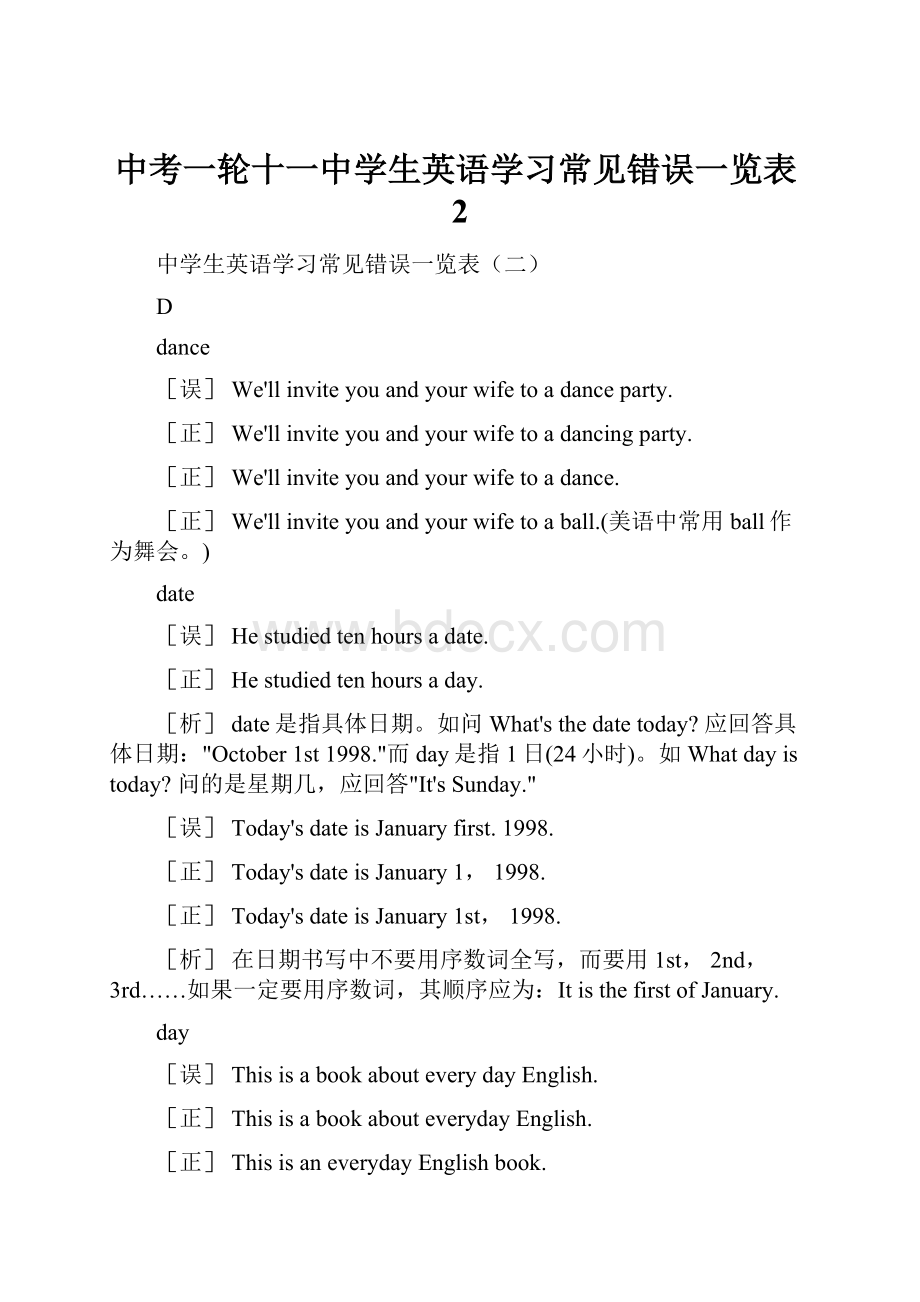中考一轮十一中学生英语学习常见错误一览表2.docx
《中考一轮十一中学生英语学习常见错误一览表2.docx》由会员分享,可在线阅读,更多相关《中考一轮十一中学生英语学习常见错误一览表2.docx(29页珍藏版)》请在冰豆网上搜索。

中考一轮十一中学生英语学习常见错误一览表2
中学生英语学习常见错误一览表
(二)
D
dance
[误]We'llinviteyouandyourwifetoadanceparty.
[正]We'llinviteyouandyourwifetoadancingparty.
[正]We'llinviteyouandyourwifetoadance.
[正]We'llinviteyouandyourwifetoaball.(美语中常用ball作为舞会。
)
date
[误]Hestudiedtenhoursadate.
[正]Hestudiedtenhoursaday.
[析]date是指具体日期。
如问What'sthedatetoday?
应回答具体日期:
"October1st1998."而day是指1日(24小时)。
如Whatdayistoday?
问的是星期几,应回答"It'sSunday."
[误]Today'sdateisJanuaryfirst.1998.
[正]Today'sdateisJanuary1,1998.
[正]Today'sdateisJanuary1st,1998.
[析]在日期书写中不要用序数词全写,而要用1st,2nd,3rd……如果一定要用序数词,其顺序应为:
ItisthefirstofJanuary.
day
[误]ThisisabookabouteverydayEnglish.
[正]ThisisabookabouteverydayEnglish.
[正]ThisisaneverydayEnglishbook.
[误]Wegotoschooleveryday.
[正]Wegotoschooleveryday.
[析]everyday是形容词,意为"日常的",而everyday则是"每天"、"天天"之意。
dead
[误]Myfatherhasdiedfortenyears.
[正]Myfatherhasbeendeadfortenyears.
[析]die是瞬间动词,它可以用于完成时,如:
Myfatherhasdied.但用于完成时不能与表示一段时间的状语连用。
它也可以用于过去时,如:
Myfatherdiedthreeyearsago
[误]We'llalwaysrememberthedeadswhowerekilledinthewar.
[正]We'llalwaysrememberthedeadwhowerekilledinthewar.
[析]形容词前如加定冠词表示一类人,如therich(富人),thesick(病人),thepoor(穷人),其后的谓语动词要用复数,如:
Thericharenotalwayshappy.
deaddeadly
dead在某些词组里是"完全"、"的确"的意思,如deadright,deadtired,deadsure。
而deadly则是"致命的",如:
Therichmanhadmanydeadlyenemies.又如:
Cancerisadeadlydisease.
deaddied
dead是形容词,如:
MrsGintywasdead.而died是动词die的过去式及过去分词,如:
Shediedin1960.但英语中如表达出对某人去世的伤感说法是passaway,如:
Myfatherpassedaway,thismorning.
deer
[误]Inthezoo,therearemanydeers.
[正]Inthezoo,therearemanydeer.
[析]deer是单、复数同形的词,如:
onedeer,twodeer,这样的名词还有fish,sheep等。
但如果讲Therearemanyfisheshere.这句话应译为"这里有许多种鱼类。
"而不应译为"这里有很多鱼。
"
desk
[误]Theboysatinhisdesk.
[正]Theboysatathisdesk.
[析]在课桌旁坐着应用介词at,而atdesk则应译为"在学习",attable应译为"在吃饭"。
die
[误]InSouthAfricamanypeoplediedfromcancer.
[正]InSouthAfricamanypeoplediedofcancer.
[误]Theoldmandiedofoverwork.
[正]Theoldmandiedfromoverwork.
[析]死于疾病应用dieof,而死于某种外因事故则多用from.
[误]Hismotherisdied.
[正]Hismotherisdead.
[误]Theoldwomanwasdeadattheageofseventy.
[正]Theoldwomandiedattheageofseventy.
[析]dead是形容词,而die是动词。
形容词表示状态,动词则表示动作。
[误]Hediedinatrafficaccident.
[正]Hewaskilledinatrafficaccident.
[析]由于事故而造成的死亡一般用tobekilled.
[误]Whenthedoctorcame,theoldmanhadalreadydied.
[正]Whenthedoctorcame,theoldmanwasalreadydead.
[正]Theoldmandiedbeforethedoctorcame.
different
[误]Myroomisdifferentwithyours.
[正]Myroomisdifferentfromyours.
[误]Thevillageisverydifferentwithwhatitwas.
[正]Thevillageisverydifferentfromwhatitwas.
[析]differentfrom是"与……不同"之意。
difficult
[误]Englishisverydifficulttobelearned.
[正]Englishisverydifficulttolearn.
[误]Helearnedphysicsisdifficult.
[正]Itisverydifficultforhimtolearnphysics.
[析]要学习英语的表达法而不要生硬地按字去译中文。
Itisdifficultforsomebodytodosomething.为"对于某人来说做某事很困难。
"
difficulty
[误]Therewaslittledifficultytofindhim.
[正]Therewaslittledifficultyinfindinghim.
[析]这种用法还有trouble,即difficulty(trouble)indoingsomething.
dinner
[误]Whendidyouhavethesupper?
[正]Whendidyouhavesupper?
[析]英语中一日三餐前无冠词,例如:
[误]Ihadalunchat12o'clock.
[正]Ihadlunchat12o'clock.
[析]在某些特定场合,如指某次宴会,则要加冠词,如:
Thedinnerwasgiveninhonouroftheguest.
dress
[误]Myfatherboughtanewdressforhimselfyesterday.
[正]Myfatherboughtanewsuitforhimselfyesterday.
[析]一般来讲男套装用suit,女服则用dress;作男服的服装店是tailorshop(tailor's),而做女装的服装店是dressmaker's.
[误]Themotherdressedtheclothesonherchild.
[正]Themotherdressedherchild.
[析]dress作及物动词当"穿衣服"讲时,其后不能接衣服而只能接人,如:
Theboyisstilltooyoungtodresshimself.但作为一种穿着打扮的状态时,则多用其过去分词作形容词,如:
Heisnotdressedinhisnewsuit.或Sheisdressedinred.词组dressup是过节日时应服装整齐,如:
Theydressedupfortheholiday.
dresshaveonputonwear
要区别这几个动词需分清是表示动作的动词还是表示状态的动词。
表示状态的动词是haveon和wear,如:
Hehasonawhitecoat.Hewaswearingheavyshoes.而puton则表示穿衣的动作,如:
Putonyourcoat,itiscoldoutside.而dress即可以作状态又可以作动作,作动作讲时其后面接人而不能接衣服,作穿着状态时则多用dressed的形式。
如:
Isawaladydressedinred.Isawagirldressingherself.
drop
[误]Thestudentsfelltheirvoice.
[正]Thestudentsdroppedtheirvoice.
[析]drop与fall都可以表示"落下、掉下"之意,有时可以互换,如:
Thedictionaryfell(dropped)fromthetable.但drop还可以作及物动词,而fall一般只能作不及物动词。
[误]Ishalldropinyou.
[正]Ishalldropinonyou.
[析]dropin是随便拜访某人,而其后要接人时应加介词on再加人称。
during
[误]DuringIwassick,Icouldn'teatwell.
[正]WhileIwassick,Icouldn'teatwell.
[析]during后不能接从句,而when和while后可接从句。
[误]IhavebeenstudyingEnglishduringthreedays.
[正]IhavebeenstudyingEnglishforthreedays.
[析]during不能表达一个动作持续多长的时间,而只能表达在某段时间内某事件的发生。
即带有由during引导的时间状语的句子只能用过去时,不能用完成时。
E
each
[误]Everyofthemhashishabit.
[正]Eachofthemhashishabit.
[析]each可以作形容词,但也可作代词,而every只能作形容词。
[误]ThemanagercomestoAmericaalmosteachmonth.
[正]ThemanagercomestoAmericaalmosteverymonth.
[析]each与every都作形容词讲时,都有"每个"之意,但有不同。
each多指个体,而every则多指整体。
如:
Wewanteverystudenttosucceed.each不同来表达总体概念,所以不能与almost,nearly,likely等词连用。
[误]Weeachhasabook.
[正]Weeachhaveabook.
[析]each作同位语时,其数应与其同位的名词相同,而each作主语时则应取其单数形式。
eachotheroneanother
eachother与oneanother这两个词组的区别在很多语法书中强调eachother是两者之间,而oneanother是多者之间,其实不然,如:
Allstudentsmustcareforeachother,mustloveandhelpeachother.事实上这两个词组是同义的,如果要讲有什么区别的话,当我们非常笼统地谈,而不特指什么人时,多用oneanother.
early
[误]Couldyoucomeheremoreearly?
[正]Couldyoucomehereearlier?
[析]单音节和少数双音节副词的比较级和最高级要用er和est来作其结尾,如fast,soon,early,hard,long,near等。
earth
[误]Whatontheearthdoyoumean?
[正]Whatonearthdoyoumean?
[析]onearth这一词组在句中为的是加强语气,其意为"究竟"、"到底"。
而作为"地球"讲时则要加定冠词,如:
Howfaristheearthfromthemoon.而作为"泥土"讲时则为不可数名词,如:
Hefilledthepotwithearthandwantedtoplantsomeflowers.
easy
[误]Youcaneasyimaginemysurprise.
[正]Youcaneasilyimaginemysurprise.
[析]easy只在有限的词组中被用作副词,如takeiteasy(不要紧张),goeasy,standeasy等。
例如:
Easycome,easygo.(钱来的容易花的也快.)Easiersaidthandone.(说的容易做着难。
)
east
[误]JapanisontheeastofChina.
[正]JapanistotheeastofChina.
[析]在讲述地理位置时,有3个介词常用,它们是in,on和to,其中in表示处于所表达的范围之内,如:
ShanghaiisintheeastofChina.on则表示双方接壤,如:
NorthKoreaisonthenortheastofChina.而表示互不相接的两部分时则用to,如:
TaiwanistotheeastofFujian.
either
[误]-Idon'tlikeopera.
-Idon'tliketoo.
[正]-Idon'tlikeopera.
-Idon'tlikeeither.
[析]在否定句中用either表示"也",而在肯定句中用too表示"也"。
[误]EitheryouorIareright.
[正]EitheryouorIamright.
[析]这在语法书中被称作就近原则,即哪个主语离谓语动词近,则应采用与哪个主语相一致的谓语动词,相同用法的还有neither…nor…,notonly…butalso…,以及or在连接两个主语时。
如:
Youorheistogohome.Theotherswillhavetostayintheclassroom.
elder
[误]MyolderbrotherhasgonetoShanghai.
[正]MyelderbrotherhasgonetoShanghai.
[析]在表示兄姐的长幼时应用elder表示"哥哥姐姐",如:
myeldersister姐姐,但表示岁数时则多用older,如:
SheistwoyearsolderthanI.
empty
[误]Aretheseseatsempty?
[正]Aretheseseatstaken?
[析]empty是指空洞的没有任何物体,如:
Thehousewasempty,其意思是没有任何家具或屋内无人。
但座位是否有人坐应用take.
English
[误]MysisterstudiedEnglishlanguageverywell.
[正]MysisterstudiedtheEnglishlanguageverywell.
[正]MysisterstudiedEnglishverywell.
[析]在泛指某一种学科时,不应加冠词,如:
Ilikehistory.但如特指某一门学科时则应加冠词,如:
HelikesthehistoryofAmerica.
enjoy
[误]Ienjoytoplayfootball.
[正]Ienjoyplayingfootball.
[析]enjoy后要接动名词,而不接不定式。
[误]DidyouenjoyattheEnglishevening?
[正]DidyouenjoyyourselfattheEnglishevening?
enough
[误]I'msorry.Youarenotstudyingenoughcarefully.
[正]I'msorry.Youarenotstudyingcarefullyenough.
[析]enough要用在形容词或副词之后。
[误]Doyouhaveenoughofmoney?
[正]Doyouhaveenoughmoney?
[正]Doyouhaveenoughofthemoney?
[误]Thecoffeeisn'tenough.
[正]Thereisn'tenoughcoffee.
[析]enough可以作be动词的表语,但其主语应是代词,如:
That'senough.Itwasenough.如果是名词时应换用上面的句型。
entrance
[误]Theentranceofthecinemaisonyourright.
[正]Theentrancetothecinemaisonyourright.
[析]在表示通往某处时entrance后面多用to作介词。
这样的用法还有keytothedoor,answertothequestion等。
evening
[误]Iwalkedhomeinacoldevening.
[正]Iwalkedhomeonacoldevening.
[析]intheevening这一词组如加上另外的修饰词则其介词应换为on.
everyone
[误]Everyoneofyougoestoclass.
[正]Everyoneofyougoestoclass.
[析]everyone其后不能接of结构。
在否定句中如果要讲"每一个人都没有注意到它",就译作:
Nobodynoticedit.要注意Everyoneofusisnotright.应译为"我们不都对。
"而Noneofusareright.才应译为"我们全错了。
"
exam
[误]Wetakepartinanexam.
[正]Wetakeanexam.
[析]takepartin为"参加"某种活动,运动,而在学科中选择某一学科学习并进行考试应用take.
except
[误]Theroomiscleanexcepttwodesks.
[正]Theroomiscleanexceptfortwodesks.
[误]IcomehereeverydayexceptforSunday.
[正]IcomehereeverydayexceptSunday.
[析]在同一类物体中排除某一部分用except,在不同类物体中排除某一物体时用exceptfor。
而exceptthat其后接从句,如:
Sheisagoodgirlexceptthatsheiscarelesssometimes.而besides则是"包括在内",如"我学习英语同时还学法语。
"应译为:
IstudyEnglishbesidesFrench.
exercise
[误]ThestudentsexercisespokenEnglishinthemorning.
[正]ThestudentspractisespokenEnglishinthemorning.
[析]exercise多指运动、训练,而practise则多指把理论付诸于实践的练习。
[误]Everyoneshoulddoexerciseseveryday.
[正]Everyoneshoulddoexerciseeveryday.
[析]作为运动讲exercise是不可数名词,而当"练习"、"体操"、"早操"则是可数名词,例如:
IdoalotexercisesintheP.E.class.
F
fail
[误]Tomfailedhisexam.
[正]Tomfailedinhisexam.
[正]Tomfailedtopasstheexam.
[析]fail为不及物动词,其后可用in加名词,或直接接不定式。
family
[误]I'msorryIhavetogo.Tom'sfamiliesarewaitingforme.
[误]I'msorryIhavet